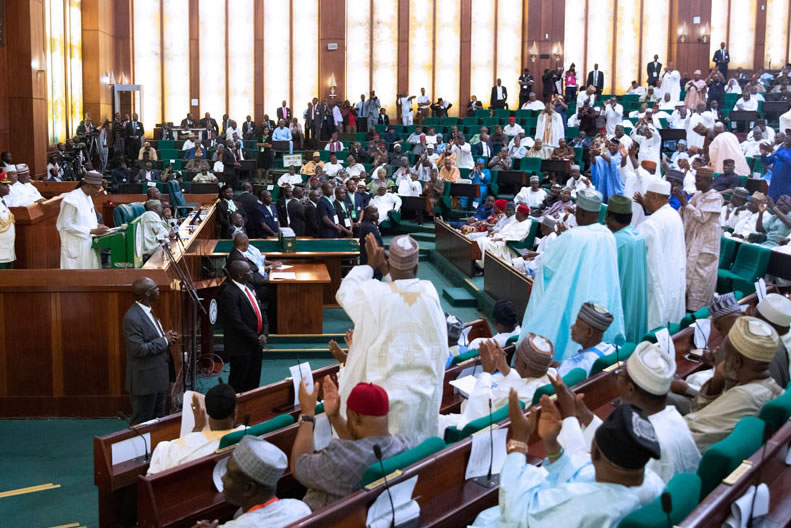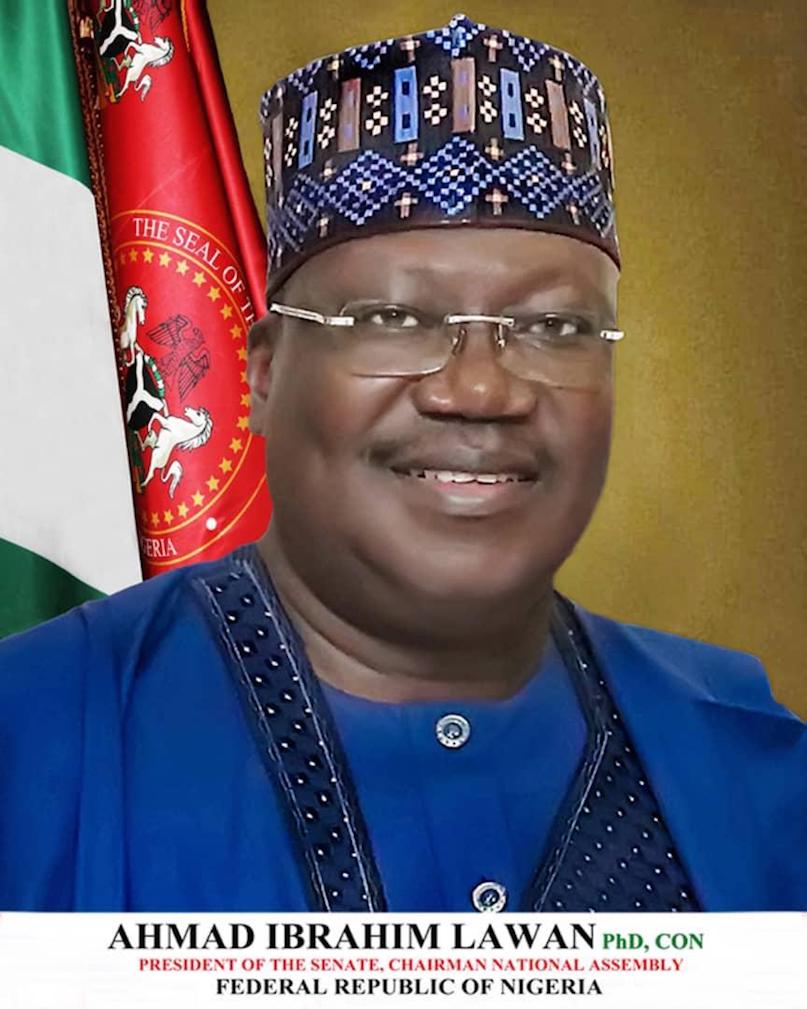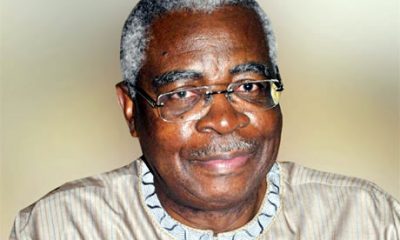Economy
N/Assembly Passes Buhari’s Revised 2022 Budget
.Approves N4trn for Fuel Subsidy
.N182bn Increment to Police Salary
.N7.35trn deficit. $73 Per Barrel Oil Benchmark

By Ubong Ukpong, Abuja
The Senate and the House of Representatives approved the sum of N4 trillion for petrol subsidy in the 2022 supplementary budget.
The approval followed President Muhammadu Buhari’s request to the National Assembly, to approve a “Bill for an Act to amend the Appropriation Act, 2022 in order to provide for Premium Motor Spirit Subsidy and make Adjustments on the Schedule; and for Related Matters.
The House also approved N182 billion Increment to Police Salary, N7. 35 trillion deficit as well as okayed US$73 per barrel oil benchmark.
These followed the consideration and adoption of the report of the House Committee on Finance on the request by the President for revision of the 2022 Fiscal Framework and passage of a bill for an Act to amend the Appropriation Act, 2022.
Buhari in a letter requested the review of the 2022 MTEF to make some adjustments to accommodate present realities such as oil production and price as well as suspension of the removal fuel subsidy.
Going by this, the House approved an increase in the oil benchmark to $73 per barrel and a daily oil production volume of 1.6 million barrels per day.
Other approvals included a cut in the provision for federally-funded upstream projects being implemented by N200 billion from N352.80 billion; increase in the projection for Federal Government independent revenue by N400 billion.
Also approved was domestic debt service provision of N76.13 billion, and net reductions in Statutory Transfers by N66.07 billion, as follows:
“Niger Delta Development Commission (NDDC), by N13.46 billion from N102.78 billion to N89.32 billion; North East Development Commission (NEDC), by N6.30 billion from N48.08 billion to N41.78 billion; and Universal Basic Education (UBEC), by N23.16 billion from N112.29 billion to N89.13billion.
“Basic Health Care Fund, by N11.58 billion from N56.14 billion to N44.56 billion; and that NASENI, by N11.58 billion from N56.14 billion to N44.56 billion.”
The President had also requested for an increase in the estimated provision for petrol subsidy for 2022 by N3.557 trillion, from N442.72 billion to N4.00 trillion.
Briefing House of Representatives correspondents on the passed revised budget, Chairman House Committee on Appropriation Hon Mukhtar Betara expressed satisfaction with the passage by House, saying it would help the President to achieve his policy.
He said people should take it easy with the criticism of the military over its heavy budgets, stressing that the large chunk of military budgets often went for recurrent and salaries of personnel, with meagre capital and overhead allocations.
Betara said with the present approved increment for the police, its budget would also become huge in recurrent and salaries.
Senate approves Buhari’s revised 2022 fiscal framework
The Senate also approved President Buhari’s request for adjustments to the 2022 Fiscal Framework. The approval followed the consideration of a report by the Senate Committee on Finance. The report was laid and presented by the Chairman of the Committee, Sen. Olamilekan Adeola(APC Lagos).
Senate accordingly approved the $73 dollars per barrel proposed by President Muhammadu Buhari, including approving oil production volume of 1.600 million per day, a Petroleum Motor Spirit (PMS) subsidy of N4trilion; and a cut in the provision for Federally funded upstream projects being implemented by N200 billion from N352.80.
While approving an increase in the Federal Government Independent Revenue of N400 billion, Senate gave its approval for an additional provision of N182.4 billion to cater to the needs of the Nigeria Police Force. It approved debt service provision of N76.13 billion, and net reductions in Statutory Transfers by N66.07 billion. A breakdown of the net reductions are as follows: NDDC, by N13.46 billion from N102.78 billion to N89.32 billion; NEDC, by N6.30 billion from N48.08 billion to N41.78 billion; and UBEC, by N23.16 billion from N112.29 billion to N89.13 billion.
Others are Basic Health Care Fund, by N11.58 billion from N56.14 billion to N44.56 billion; and NASENI, by N11.58 billion from N56.14 billion to N44.56 billion. The chamber also approved a fiscal deficit of N7.35 trillion.
In his presentation, Adeola said that the total budget deficit was projected to increase by N965.42 billion to N7.35 trillion, representing 3.99 per cent of Gross Domestic Product (GDP). According to him, the incremental deficit would be financed by new borrowings from the domestic market.
Lawmakers, who made contributions on the report for the review of the 2022 fiscal framework, attributed the Nigeria’s economic downturn to crude oil theft. Sen. Olubunmi Adetunmbi (APC- Ekiti ), said the federal government and security agencies owed it a duty to stop the stealing of our common wealth. He decried that at a time when most countries of the world were reaping hugely from the increase in crude oil prices caused by the Russia-Ukrainian crisis, Nigeria was left out for its inability to meet its OPEC quota.
The Senate Leader, Yahaya Abdullahi, said the country should be in a state of mourning over its current experience, attributing the failure of security agencies to protect oil assets as a major reason for the decline of the economy. He expressed concern over rising cases of oil theft despite huge resources allocated to the military, police and other security agencies.
Other Senators, like Gabriel Suswam (PDP Benue ), Betty Apiafi (PDP Rivers), urged the Senate not to hastily approve the President’s request to adjust the 2022 fiscal framework until certain questions were answered.
While Suswam raised concerns on the widening gap in budget deficit and the federal government’s decision to resort to funding from the Capital Market, Apiafi, demanded answers from the NNPC and relevant agencies on solutions to curb crude oil theft. The Senate President, Ahmad Lawan, in his concluding remarks, called on the Federal Government to take “radical” steps towards stopping the theft of crude oil by economic saboteurs.
Senate passes N17.3trn Revised 2022 Budget
The Senate similarly passed the revised 2022 N17.3trillion budget. Its action followed the adoption of the report of Senate Committee on Appropriation at Thursday’s plenary.
Presenting the report, Senator Barau Jibrin, the Chairman of the committee said that the budget was made up of N7 trillion recurrent expenditure and N5 trillion capital expenditure, while N817 billion was for statutory transfers.
Jibrin said that N3 trillion of the budget was for debt service. “Also, the Senate approved the total sum of N3.55 trillion for PMS subsidy in 2022, forwarded in two separate requests by the President to the National Assembly for approval,” he said.
Economy
SEC Advocates Advanced Financial Inclusion by 2030

By Tony Obiechina, Abuja
The Securities and Exchange Commission (SEC) has stressed the need for Nigeria to harness its demographic dividend to advance financial inclusion through investments by 2030 for national survival or face deepening inequality.
The Director-General of the SEC, Dr Emomotimi Agama said this at the United Capital Asset Management Investment forum on Wednesday in Lagos.
Agama, in his keynote address titled: “Advancing Financial Inclusion through Investments: Bridging
Nigeria’s Knowledge and Wealth Gap,” said Nigeria must harness its demographic dividend to boost investment.
“Our theme, Advancing Financial Inclusion through Investments, is not aspirational; it is foundational to national survival.
“We stand at a pivotal moment. By 2030, Nigeria can either harness its demographic dividend or face deepening inequality. The knowledge-wealth gap is not merely an economic challenge; it is a moral imperative,” Agama said.
He said the term inclusion should be reframed as active financial involvement, where access meets empowerment, and capital becomes a tool for transformation.
Agama said that closing the financial inclusion gender gap could lift 700,000 Nigerians from poverty.
He said, “Nigeria has a great population yet we have a tiny drop of this number of persons involved in the capital market.
“That one reason for poverty, because we are running from money. We have to do something. Our market capitalisation is an opportunity to do something,
We all have
“We need to change the narrative and move the market forward. We must reach out to make the difference. We are committed to protecting investors and developing the market. Our goal is to do the right thing no matter whose ox is gored. We will work by the principles of fairness and equity to change the market. We will provide a fair ground for everyone to aspire.
He noted that MTN Nigeria’s share offering drew 150,000 new investors – 75 per cent women, 85 per cent under 40.
Agama recommended a four-pillar strategy for bridging the gaps.
He listed the four-pillar strategy as democratisation of financial knowledge, catalyse MSME Investment Channels, blended Finance Vehicles: Partner with Bank of Industry (BOI) to de-risk loans for women-led SMEs.
“We need to educate people about finances. As we drive this market, we do so for a purpose, I enjoin everyone to be the disciple and the apostles. Getting this market to move is a deliberate action,” he added.
| ReplyReply allForwardAdd reaction |
Economy
NPA Assures of Over N1.27trn Revenue in 2025

By Ubong Ukpong, Abuja
The Nigerian Ports Authority (NPA) on Monday assured that it would take into the coffers massive revenue of over N1.27 trillion in 2025, representing a 40 percent increase from the N894.86 billion it realized in 2024.
This ambitious target, the Authority said, was anchored on sweeping modernization efforts, the full activation of the Dangote Refinery’s marine operations, and the deployment of cutting-edge technology to enhance port efficiency.
Managing Director of the NPA, Abubakar Dantsoho, disclosed this in a presentation during his agency’s budget defence session wih the House of Representatives Committee on Ports and Harbours, where he defended the agency’s 2025 budget estimates and provided insights into its 2024 performance.
“Our 2025 budget proposal is more than figures, it reflects our aspirations for a more efficient, globally competitive port system,” Dantsoho told lawmakers, adding that over 70% of the proposed expenditure will go into capital projects.
For 2024, the Authority surpassed its revenue target of N865.39 billion, posting an actual realization of N894.86 billion.
However, Dantsoho revealed that only N417.86 billion, less than half of the approved N850.92 billion expenditure, had been spent as of the time of reporting.
Despite this, NPA made a record contribution of N400.8 billion to the Consolidated Revenue Fund (CRF) in 2024, nearly double the N213.23 billion remitted in 2023. Of this amount, a staggering N344.7 billion was deducted at source.
“This shows our unwavering commitment to national revenue generation, even when our own operational liquidity is affected,” the NPA boss stressed.
Dantsoho said the projected revenue increase is premised on several key assumptions and developments, including: The full operation of the Dangote Refinery, which alone is expected to draw in over 600 vessels annually through its Single Point Mooring (SPM) system; the commissioning of upgraded terminals at WACT and OMT, which will enhance container traffic; the implementation of automation tools such as the National Single Window, Port Community System (PCS), and Vessel Traffic Management System (VTMS); and increased cargo volumes stemming from global disruptions, including the Russia-Ukraine conflict, which has affected global trade routes.
He said the 2025 revenue is expected to come from the following key sources: Ship Dues, N544.06 billion; Cargo Dues, N413.06 billion; Concession Fees, N249.69 billion; and Administrative Revenue, N73.07 billion
Of the proposed N1.14 trillion total expenditure for 2025, N778.46 billion is earmarked for capital projects.
This investment, he said, will target the revitalization of critical infrastructure, including the Calabar, Warri, and Burutu ports and channels, and enhance towage services, channel depth, and compliance with international security conventions.
“Investments in infrastructure and technology are non-negotiable if we are to stay competitive regionally and globally,” Dantsoho emphasized.
He cited increasing competition from neighboring ports and aging assets across Nigeria’s coastal corridors.
The NPA also intends to address technology gaps by upgrading legacy systems and bolstering cybersecurity, ensuring Nigerian ports meet global standards for digital operations.
“We can say that with timely access to internally generated revenue and capital funds NPA would deliver the kind of impact Nigeria expects,” he said.
Chairman of the Committee, Hon. Nnolim Nnaji, urged the NPA to ramp up performance, improve port infrastructure, and play a greater role in addressing Nigeria’s revenue and unemployment challenges.
Nnaji said the ports remain a critical pillar of Nigeria’s economy, and urged the agency to meet rising expectations despite operational challenges.
“No country can thrive economically without high-performing ports. They are the economic heartbeat of every nation, determining how buoyant a country is through the flow of imports and exports,” Hon Nnaji said.
The committee praised NPA for its performance.
Nnaji stressed that the NPA’s performance has implications beyond maritime activity, noting that increased port output can significantly boost job creation across several sectors.
“The Nigerian Ports Authority is not just a revenue-generating agency, it is a national asset in terms of employment and economic impact.
“We expect to see detailed strategies on how to improve revenue generation and expand employment opportunities through your 2025 budget,” he said.
The lawmaker also pointed to growing interest in the development of new ports across the country but cautioned against neglecting existing port infrastructure.
“As we welcome investment in new ports, we must not abandon the old ones. Maintaining and upgrading our existing ports, both in the Eastern Corridor and the Western axis, is essential to long-term sustainability,” he added.
The Committee called for a clear outline from the NPA on how its 2025 financial plan will address pressing national concerns and reaffirm Nigeria’s competitiveness in regional and global maritime trade.
Economy
Senate Sets N10trn Revenue Target for NCS, Urges Agency to Curb Smuggling, Illicit Drugs

By Eze Okechukwu, Abuja
The Senate, through its Committee on Customs has set a revenue target of N10 trillion for the Nigeria Customs Service for the 2025 fiscal year, instead of the initial N6.584 trillion given to her earlier on while urging the agency to clamp down on smuggling and Illicit drugs.
The Chairman of the Committee, Senator Isah Jibrin (Kogi East), who gave the agency the marching order yesterday in Abuja during the budget defence of the revenue driving agency however commended her for exceeding its 2024 revenue target of N5.
079 trillion.The NCS team led by Deputy Comptroller General, Jibo Bello who represented the Comptroller General presented the 2024 budget performance with a revenue target of N5.
079 trillion, stressing that the proposal was exceeded by over a trillion naira.The Committee, obviously impressed by the performance commended NCS before asking them to go ahead and present the 2025 budget proposal, which the agency tied at N6.584 trillion revenue target with an expenditure of N1.132 trillion.
Following their presentation, members of the Senate Committee on Customs unanimously approved the recommendation of the revenue target of N6.584 trillion and the expenditure of N1.132 trillion for the 2025 financial year.
The Committee will subsequently present the budget proposal to the Senate at plenary most likely this week as the red chamber resumes today after a long recess tied to Eid celebration.
In his final remarks, Senator Jibrin emphasised the need for the NCS to rise up in terms of its surveillance with respect to illicit drugs and smuggling “to ensure that, as much as possible, you should be on top of your game”.
He said there are so many illicit drugs flowing all over the place, which according to him “is contributing to the issue of banditry in Nigeria because most of these guys are on drugs. What I’m saying is that, in addition to your revenue drives, you should also be mindful of some of these other functions.























